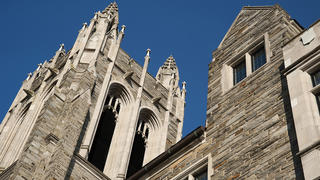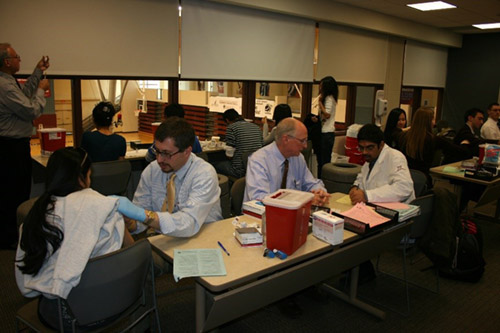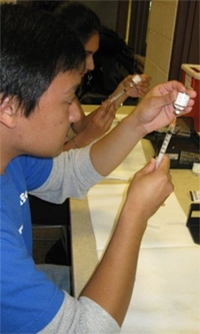Student H1N1 Lessons Learned Continues to Impact Additional Public Health Efforts

Editor's note: This article was written prior to University of the Sciences' merger with and into Saint Joseph's University and does not reflect the current, combined institution. References to programs, offices, colleges, employees, etc., may be historical information.

In the middle of the COVID-19 pandemic, the University of the Sciences community is reminded that our alumni, who are leaders, scientists, and clinicians, continue to fight the COVID-19 pandemic through research, direct patient care activities, public health efforts, and many more initiatives.
One of the many reasons why USciences alumni are called upon to lead in their communities and organizations for various public health issues is because of the wide set of knowledge, skills, and experiences we have obtained throughout our education as students.
As a pharmacist who trained at the Philadelphia College of Pharmacy, many of my skills were formed from my experiences with professional student organizations, time spent with professors, and experiential practice rotations. Because of this, I had the ability to see how clinicians, scientists, and leaders addressed many clinical and operational issues firsthand, including the H1N1 pandemic.
 In 2009, I was given the opportunity to serve the University of the Sciences community by preparing H1N1 vaccinations for mass immunizations. At the time, University of the Sciences representatives worked directly with the City of Philadelphia Department of Public Health Division of Disease Control in H1N1 preparedness, and on November 6, 2009 the first batch of vaccines were distributed to students who had direct contact with patients, who were on rotation, or who were scheduled to go on rotation to locations that required an H1N1 vaccination.
In 2009, I was given the opportunity to serve the University of the Sciences community by preparing H1N1 vaccinations for mass immunizations. At the time, University of the Sciences representatives worked directly with the City of Philadelphia Department of Public Health Division of Disease Control in H1N1 preparedness, and on November 6, 2009 the first batch of vaccines were distributed to students who had direct contact with patients, who were on rotation, or who were scheduled to go on rotation to locations that required an H1N1 vaccination.
More than 10 years later, this experience as a student pharmacist taught me important lessons in leadership and how leaders, scientists, and clinicians can make an impact towards public health issues in their communities and organizations. I learned at least five valuable lessons for addressing problems that year during the H1N1 pandemic:
- Identify and pursue win-win opportunities
- Develop a diverse and multi-talented guiding coalition
- Create specific, measurable, attainable, relevant, and time-based goals with feasible tactics
- Aim for co-creation versus buy-in when collaborating with teams
- Monitor for success and hazards, especially with volatility, uncertainty, complexity, and ambiguity
Fortunately, I have been able to apply these lessons learned to address other public health issues, such as the Zika virus, the opioid epidemic, and now the COVID-19 pandemic.
As the System Medication Safety Officer for Methodist Le Bonheur Healthcare, our diverse and multi-talented teams have pursued several win-win opportunities impacting pharmacists, physicians, nurses, informaticists and more; however, the biggest “winning” group is our patients and communities in the Mid-South. Throughout our initiatives, goals, and tactics, we have co-created treatment protocols and other medication-related processes with various key stakeholders that provide safe and accessible care for tackling the COVID-19 pandemic. Because much of the pandemic has facets of volatility, uncertainty, complexity, and ambiguity, it is ever so important to monitor the adverse drug events associated with the medications issued with an emergency use authorization. Through our medication safety program, we continue to monitor and report adverse drug events with the FDA, so we can contribute to the body of knowledge for clinicians and scientists.
As I reflect on my student experiences from more than 10 years ago at University of the Sciences, I am reminded of the valuable education that I and my peers received. While diseases and other public health issues fluctuate time after time, there is definitely one thing that remains, and that is the USciences community is #proveneverywhere.
